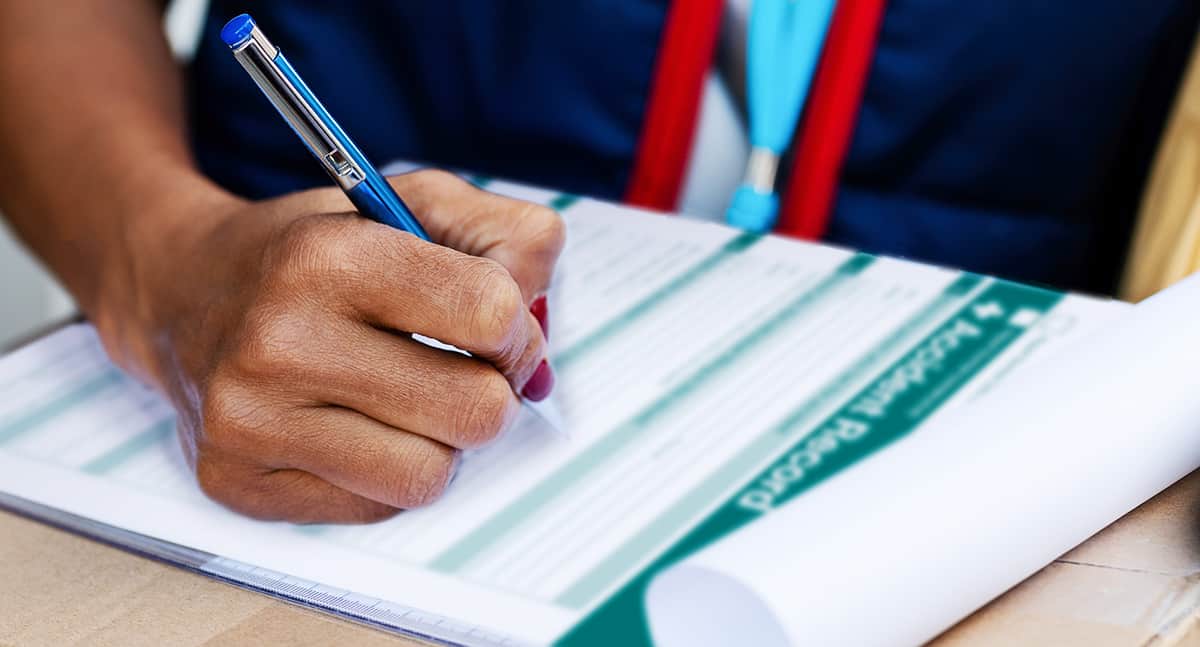
It’s legally required for employers or responsible persons in schools and workplaces to report certain illnesses and injuries to the HSE under RIDDOR. This reporting of accidents helps authorities and workplaces to better understand how accidents happen and how to prevent them in the future.
What is RIDDOR?

RIDDOR (Reporting of Injuries, Diseases and Dangerous Occurrences Regulations) is a legal requirement set by the HSE to guide action in the case of a workplace or school accident. It applies to every workplace across the UK. Under RIDDOR, employers have a legal responsibility to report certain workplace incidents, occupational diseases and some dangerous occurrences or near misses.
Does it apply in schools and early years settings?
RIDDOR applies to every workplace in the UK, including all schools. Reports need to be made when an accident happens to a student, member of staff, or a visitor. While not every accident needs to be reported to the HSE, their proper recording is important to guide the evaluation of your school’s procedures.
Accident reporting will help you to identify and correct any safety issues in your school, thereby keeping your staff and students safer. Failure to report an incident that falls under RIDDOR is illegal and could result in serious consequences for your school or early years setting.
What accidents fall under RIDDOR in schools?

Incidents involving staff
Under RIDDOR, the appointed individual in your school must report incidents to the HSE that:
- Prevent the injured individual from working normally for over seven days (excluding the day of the incident).
- Cause a reportable occupational disease for which the injured staff member received a written diagnosis from a doctor.
- Result in a specified injury or in death.
The following injuries are considered specified injuries:
- Fractures (excluding fractures of the fingers, thumbs or toes)
- Reduction or loss of sight
- Any amputations
- Unconsciousness caused by asphyxia or head injury
- Severe scalping (skin being separated from the head) that requires medical attention
- Crush injuries that cause damage to internal organs
- Severe burns that cover more than 10% of the body, or that damage the respiratory system, eyes or other vital organs
- Injuries that occur while working in an enclosed space and lead to heat illnesses or hypothermia, or that require resuscitation or hospital treatment for longer than 24 hours
The following injuries are considered reportable occupational diseases:
- Hand-arm vibration syndrome (painful and disabling disorders of the blood vessels, nerves and joints caused by the extended use of hand-held power tools and other vibrating instruments)
- Severe cramping in the hand or forearm
- Carpal tunnel syndrome (tingling, numbness and pain in your hand and fingers caused by pressure on a nerve in your wrist)
- Tendonitis or tenosynovitis of the hand or forearm
- Diseases caused by exposure to a biological agent while working
- Occupational asthma
- Occupational dermatitis
- Occupational cancers
Incidents involving students or visitors
The appointed individual in your school must report incidents to the HSE that involve students or visitors if:
- The accident occurs directly as a result of school activity or insufficient safety measures at school
- The accident results in hospital treatment or death (In this definition, examinations and diagnostic tests do not count as hospital treatment)
Any injury should be reported if it relates to:
- Any school activity, whether on school premises or elsewhere
- Substances, machinery or equipment on school grounds (For example, chemicals used in a science lesson or equipment used in a woodworking class)
- Badly maintained or designed school facilities or premises
- Lack of supervision, mismanagement or poor organisation of a school activity
If your school is on the Early Years Register, you must notify Ofsted if:
- There’s an accident on your premises involving a child under your care that results in injury or death
If your school is on the Childcare Register, you must notify Ofsted if:
- There is an accident resulting in injury or death that involves a child or anyone else on your premises, regardless of whether the child is in your care or not
- The death of a child occurs on your premises or as a result of something that happened while they were in your care
- An accident occurs that causes a child in your care to be taken to hospital immediately or at a later time
- Any incident that may affect your school’s suitability to care for children
The following incidents do not have to be reported:
- An incident that occurs as a result of a known medical condition (For example, if an asthmatic student has to be taken to hospital due to an attack triggered through no fault of the school)
- If an injured visitor or student is brought to the hospital as a precaution and not out of necessity
- Any sports injuries that occur during the normal course of play (If an injury occurs as a result of the school’s inappropriate management of foreseeable sporting risks, it is a reportable incident)
- If a school bus transporting students meets in a road accident and children are injured (These are investigated by the police as a road traffic incident)
- An incident involving violence between students
- Any incidents that involve students on an overseas trip
- Accidents in the playground such as slips, trips and falls (As long as they did not occur due to a lack of supervision or an unsuitable play area)
- Incidents that involve students on a work placement (Those students are considered employees of that business for the duration of their work placement)
Reportable Dangerous Occurrences or Near Misses
The following near misses are reportable under RIDDOR, regardless of whether they affected a student or a member of staff:
- The accidental release of a substance or biological agent that can cause serious injury or illness
- An explosion or fire caused by an electrical overload or short circuit
How to submit a school RIDDOR report

School RIDDOR reports should be submitted only by responsible persons. Reports are typically done online via the RIDDOR Report page on the HSE website. The website provides a form for each kind of reportable incident, which are automatically submitted to the RIDDOR database once complete. The HSE website allows users to download a copy of each report for their records.
While all incidents can be reported online, the HSE also provides a telephone service for the reporting of specified incidents or incidents that result in death. The Incident Contact Centre operates 8:30 to 17:00, Monday to Friday with the contact number 0345 300 9923.
Note that although they have a contact number for reporting serious injuries, the HSE is not an emergency service. Visit the ways to contact the HSE webpage for advice on when and how to report very serious incidents.
RIDDOR in schools summary
It is essential for schools to keep a record of any accidents or injuries that befall students, staff or visitors. For most incidents, it will only be necessary to complete an accident record, but some will need to be reported to the HSE under RIDDOR.Protect staff and students with school first aid kits and supplies and ensure that your school is prepared to record accidents with a pupil accident book. Properly report RIDDOR incidents to the HSE.
Read our other blogs for more information on first aid or contact us for further advice and information on our products.
About the author:
Jo Stokes is a writer, marketer and trained first aider at First Aid Online.
Find out more about Jo.
By Jo Stokes

